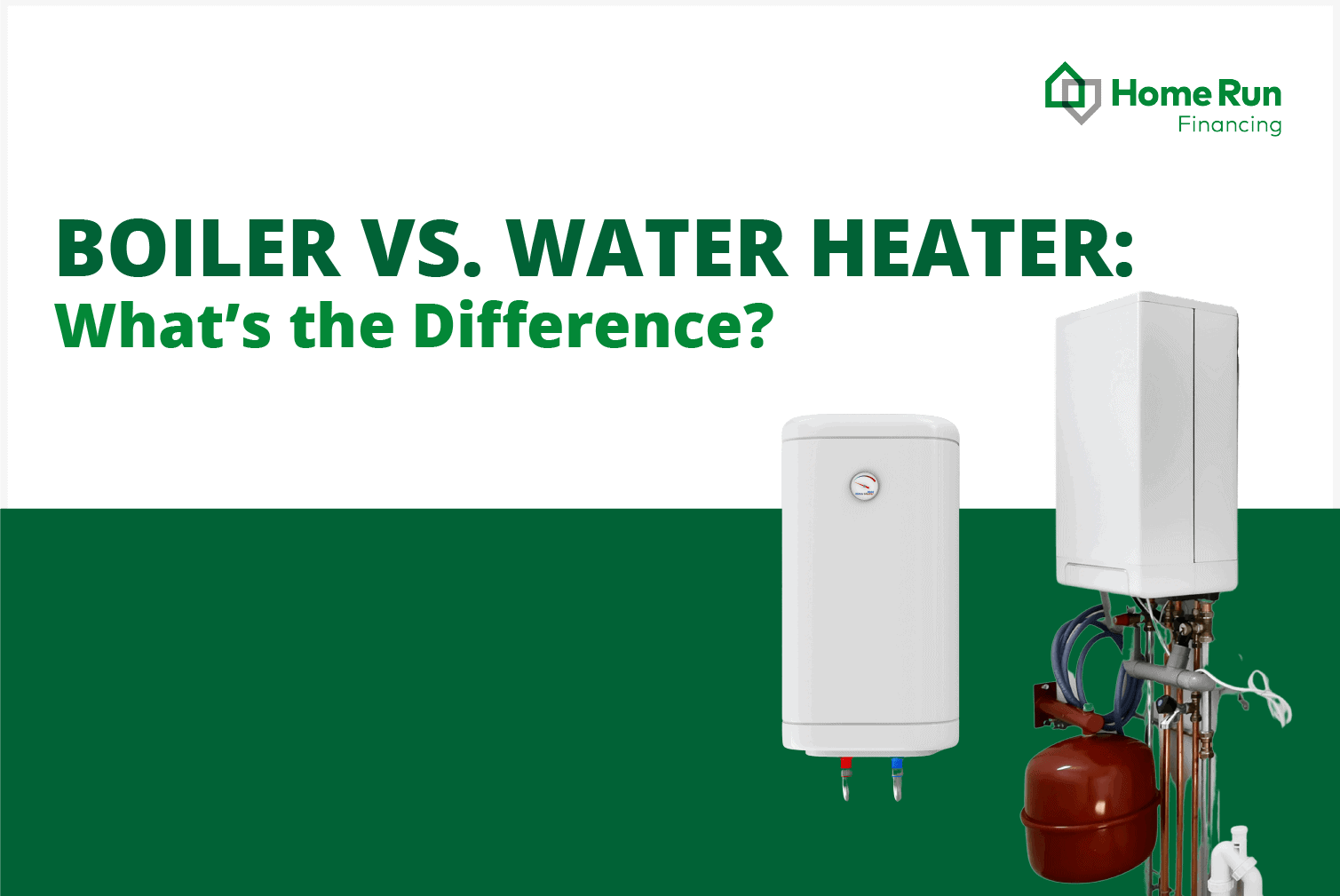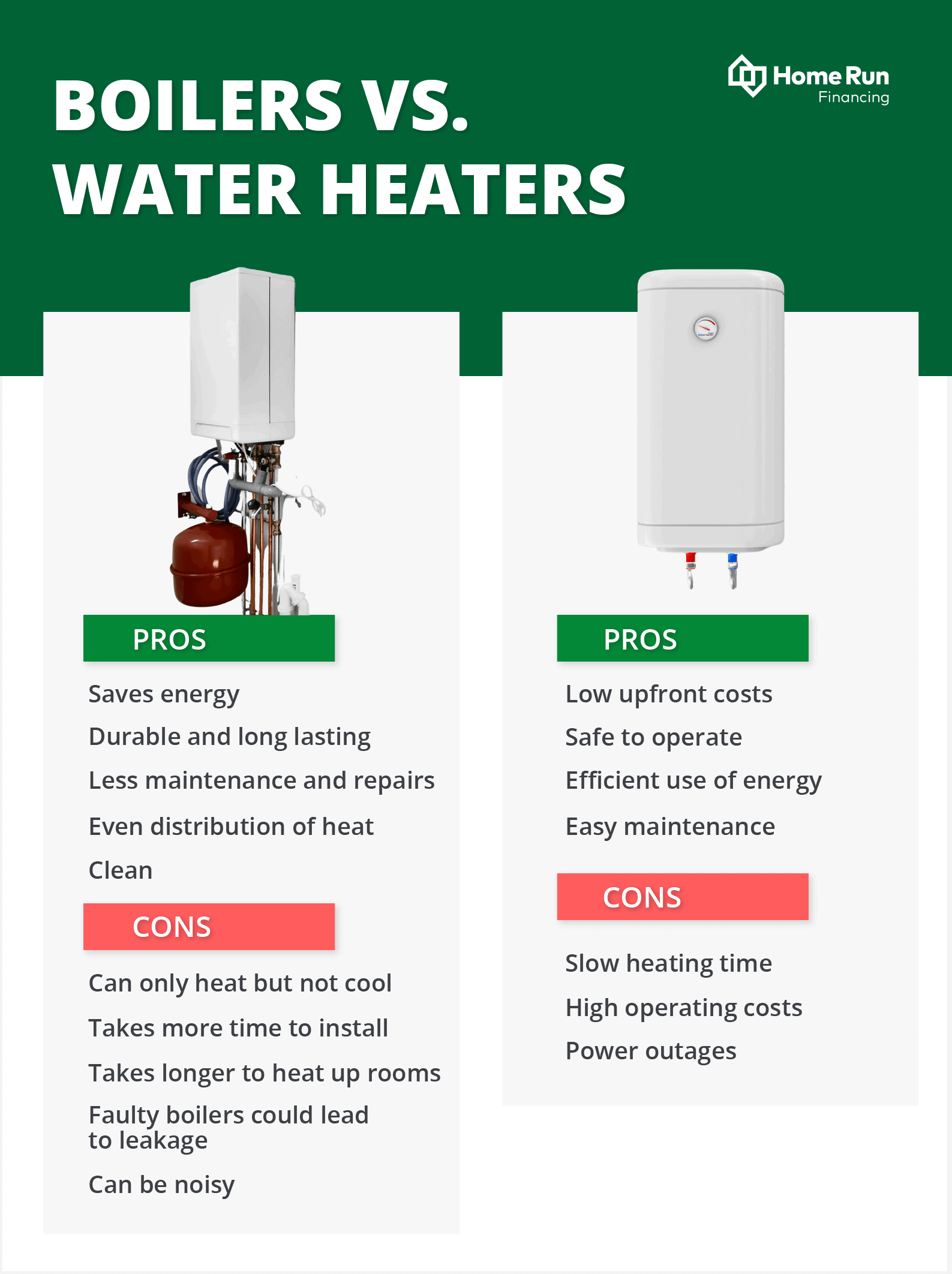
Boiler vs. Water Heater: What’s the Difference?
What’s the difference between a boiler and water heater? Both heat water, so these appliances may seem to be interchangeable. Let’s explore the differences and why you might choose one or a combination of both.
What is a boiler?
A boiler heats water for your home. Some systems pump hot water through radiators in your home. Others turn water into steam similarly distributed through radiators. Hot water used for cooking, bathing, or washing typically doesn’t come from a boiler.
Homeowners choose these heating systems when considering a boiler vs. hot water heater because both produce an even, comfortable heat without the dust and allergens from forced air. Controlling room temperature can be a matter of turning the radiator down or off. Boilers are an energy-efficient option with models that work on propane, natural gas and heating oil.
Different types of boilers
Now that the boiler question has been addressed, here are different types available:
- Steam boiler. This type of boiler turns water into steam that flows through your radiator system.
- Hot water boiler. Hot water boilers are similar to steam boilers but circulate hot water instead.
- Natural gas boiler. These hook up to your gas line, so you never have to worry about running out of fuel.
- Propane boiler. If you have propane delivered, you can attach one of these to the system to heat your home.
- Oil boiler. In homes set up for home heating oil, these boilers are ideal.
- Combination boiler. This type of boiler supplies heat for your home and heats water for bathing, washing and cooking.
- Condensing boiler. This water boiler heater recaptures heat from vented gasses for energy efficiency.
Pros and cons of a boiler
Here are some pros and cons to help you evaluate your options in the boiler vs. water heater debate.
Pros:
- Saves energy. Modern boilers and radiator systems are designed to be exceptionally energy efficient.
- Durable and long lasting. Operating in homes for more than a century, these appliances have been innovated again and again for reliability.
- Less maintenance and repairs. These are simple systems that require little maintenance. Fixing them is fairly straightforward.
- Even distribution of heat. The warmth provided is even through your home and easy to control.
- Clean. These don’t have ducts for collecting dust or fans for spewing it around. It’s a better choice, particularly if you have respiratory issues.
Cons:
- Can only heat but not cool. Using a boiler means you need a separate system for air conditioning.
- Takes more time to install. Installing the boiler is easy, but retrofitting radiators and pipes is a serious task.
- Takes longer to heat up your building. You won’t get instant warmth. It takes time to heat water or make steam.
- Faulty boilers could lead to leakage. There is always the chance you’ll develop a leak in a pipe or the boiler itself. This can cause water damage if not addressed immediately.
- Can be noisy. Pipes and radiators can clank and bang, especially early in the cold season when air might work its way out of the system.

What are water heaters?
To understand the difference between a boiler and water heater, you need to understand the latter. Hot water heaters are designed to heat water for your household, not for heating homes.
Different types of water heaters
As with boilers, you have choices. Beyond fuel, from electric to propane to heating oil, there are several different types of water heaters.
- Storage tank water heater. This type heats water and keeps it in a large tank for use.
- Tankless water heater. This type heats water on demand instead of keeping hot water in a tank.
- Heat pump water heater. These water heaters use electricity to move heat to water instead of generating heat by burning fuel. These are three times more energy efficient than conventional water heaters, according to the U.S. Department of Energy. Unfortunately, it’s faulty in areas where the temperature falls below 40°F.
- Solar powered water heater. These systems use the power of the sun to heat water in collectors. It doesn’t work well in areas that are subject to freezing temperatures.
- Condensing water heater. These systems capture heat from exhaust gasses and force it back into a heat exchanger that heats your water. It is an exceptionally energy efficient device.
Pros and cons of water heaters
Water heaters are a great convenience most people consider a necessity. Here are the pros and cons to consider in evaluating the difference between a boiler and water heater:
Pros:
- Low upfront costs. Compared to boilers, water heaters are simple and less expensive to install.
- Efficient use of energy. Many of the newer models are extremely energy efficient.
- Safe to operate. These devices rarely malfunction.
- Easy maintenance. Beyond regular inspections and having to drain the tank every year, taking care of a hot water heater is simple.
Cons:
- Slow heating time. It can take time to refill a hot water tank that has been depleted.
- High operating costs. Depending on the model and fuel time, hot water heaters can be expensive to run.
- Power outages. When you lose power, you won’t have hot water.
What to consider when choosing between a boiler and water heater
If you are considering a boiler upgrade or possibly thinking you might replace a boiler with a tankless water heater, here are some things to consider:
- Efficiency for your home. Consider the power source available and its cost, choosing among the options that are most efficient in choosing a boiler vs. water heater.
- Lifespan of each product. How long a boiler or hot water heater lasts affects how much you’ll pay long-term.
- Maintenance cost. While boilers and water heaters have a similar maintenance cost, it’s still worth weighing your options.
- Climate of your area. Certain models of boilers and hot water heaters may not work well in extremely cold temperatures.
Cover your boiler replacement costs with Home Run Financing
Of course, you will want to compare financing options. PACE financing allows you to use money you’ve already invested in your home to make critical home improvements. You don’t have to put money down upfront. The advantages of this type of financing include fast approvals, extended repayment terms and low fixed interest rates.
